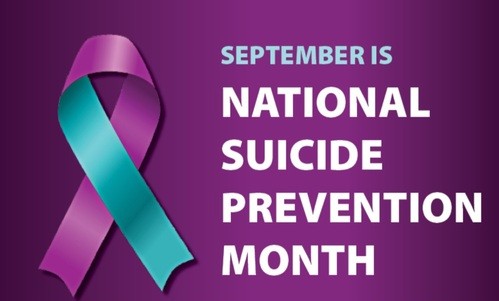
National Suicide Prevention
September was designated Suicide Prevention Month to provide a specific time each year to raise awareness, reduce stigma, and call for action to prevent suicide. The observance began in the United States in 2008 and grew from the established recognition of World Suicide Prevention Day on September 10.
The month is a time to:
The choice of September for a month-long observance was built upon existing, more specific events:
What are the Risk Factors for Suicide?
According to the Centers for Disease Control and the Mayo Clinic, a multitude of factors – individual and societal - can increase suicide risk. These may include:
· History of depression or other mental illness
· Chronic disease and pain or terminal illness
· Social isolation
· Lack of access to healthcare
· Discrimination
· Stressful life events, such as financial problems or relationship loss
· Previous suicide attempt(s)
What are the Warning Signs?
There may be no obvious indication someone is thinking of harming themselves. However, signals something is wrong may involve:
· Talking about suicide or a preoccupation with death or dying
· Risky, self-destructive behavior
· Giving away belongings with no explanation
· Increased substance use
· Severe mood swings
· Withdrawing from friends or family
I’m Feeling Suicidal. How can I get Help?
If you’re having thoughts of harming yourself, tell someone right away. Reach out to friends or family and connect with community resources like the Suicide and Crisis Lifeline or UC Counseling & Psychological Services. You can also find mental health support through University Health Services by dialing 513-556-2564 to reach the physician on call, or via the UC Student Wellness Center. Telephone counseling, crisis intervention, suicide prevention, and information and referral services are also available via The National Grad Crisis Line at 1.877.GRAD.HLP.
The month is a time to:
- Acknowledge those who have been affected by suicide, including individuals who have struggled with suicidal thoughts and the families and communities they have impacted.
- Increase public education about suicide prevention and its warning signs.
- Promote helpful resources and services for those at risk.
- Encourage compassion and break the culture of silence around mental health.
The choice of September for a month-long observance was built upon existing, more specific events:
- World Suicide Prevention Day (September 10): This day was established in 2003 by the International Association for Suicide Prevention (IASP) in partnership with the World Health Organization (WHO) to create a global commitment to prevent suicide.
- National Suicide Prevention Week: In the U.S., the American Association of Suicidology has sponsored awareness activities during the week corresponding with World Suicide Prevention Day since 1975.
What are the Risk Factors for Suicide?
According to the Centers for Disease Control and the Mayo Clinic, a multitude of factors – individual and societal - can increase suicide risk. These may include:
· History of depression or other mental illness
· Chronic disease and pain or terminal illness
· Social isolation
· Lack of access to healthcare
· Discrimination
· Stressful life events, such as financial problems or relationship loss
· Previous suicide attempt(s)
What are the Warning Signs?
There may be no obvious indication someone is thinking of harming themselves. However, signals something is wrong may involve:
· Talking about suicide or a preoccupation with death or dying
· Risky, self-destructive behavior
· Giving away belongings with no explanation
· Increased substance use
· Severe mood swings
· Withdrawing from friends or family
- I’m Worried About Someone I Know. What Should I do?
- If you believe someone may be thinking about harming themselves, ask to speak honestly with them in private about your concerns, let them know you care and listen without judgment to what they have to say. Should they share that they’re thinking about suicide, take them seriously and ensure they do not have access to lethal means to follow through. Remind them that no feeling is permanent and get help immediately. Dial or text 988 to immediately connect to the Suicide and Crisis Lifeline or CAPS (UC Counseling & Psychological Services) at 513-556-0648 to get free and confidential crisis support and resources twenty-four hours a day, seven days a week.
I’m Feeling Suicidal. How can I get Help?
If you’re having thoughts of harming yourself, tell someone right away. Reach out to friends or family and connect with community resources like the Suicide and Crisis Lifeline or UC Counseling & Psychological Services. You can also find mental health support through University Health Services by dialing 513-556-2564 to reach the physician on call, or via the UC Student Wellness Center. Telephone counseling, crisis intervention, suicide prevention, and information and referral services are also available via The National Grad Crisis Line at 1.877.GRAD.HLP.